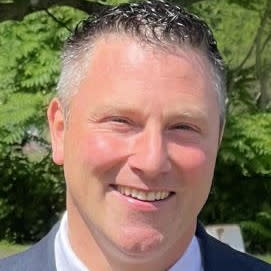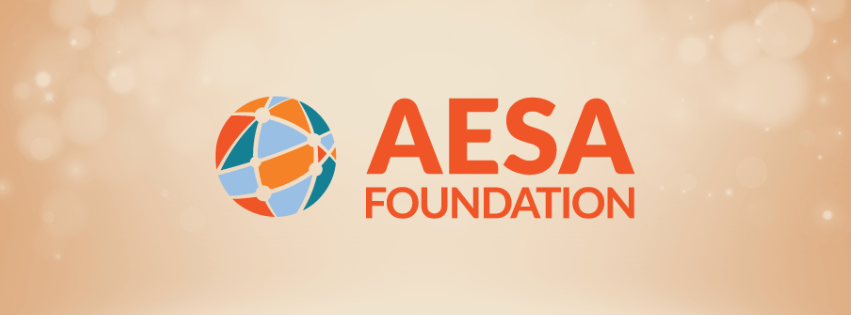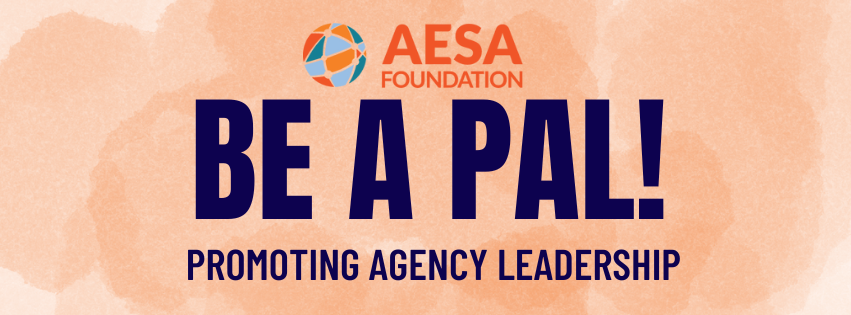|
Meet This Year's AESA Global Coordinator Training Cohort
|
Stuart Brown
West 40 ISC 2 (IL)
|
Darcy Josephson
LCSC (MN)
|
Barnabás Novák
AESA Intern
|
Anne Williamson
CREA (ND)
|
Over the eight-month program, participants are engaging in a dynamic blended learning journey designed to build both knowledge and practical skills.
This spring, the cohort will take their learning to the next level with an international trip, where they will apply their skills in a real-world practice scenario—bringing global engagement strategies to life within their ESAs.
We are excited to support these educators as they grow into leaders in global engagement. The impact of their work will extend far beyond this cohort—reaching districts, classrooms, and students across the country.
|
|
Empowering Education Through Giving
|
As we approach the AESA Annual Conference & Expo, the spirit of generosity and leadership is in full swing. The AESA Foundation is proud to present three powerful ways for our community to support educational service agencies nationwide: the Silent and Online Auctions, the PAL (Promoting Agency Leadership) program, and our annual Giving Tuesday campaign.
|
Silent & Online Auctions: Bid to Build the Future
This year, the AESA Foundation is hosting a Silent Auction at the Annual Conference & Expo in Colorado Springs, featuring a curated selection of items—from gift cards and travel packages to themed baskets and handcrafted goods. In a new twist, we’re also launching an Online Auction, allowing members across the country to participate, even if they can’t attend in person. This virtual component ensures that everyone has a chance to bid on premier experiences and support the Foundation’s mission.
Donations are still being accepted! If you’d like to contribute an item, please reach out to Tina Viletto at tviletto@aesa.us or call 267-455-2820. Every item donated helps fund scholarships and innovative programs that empower ESAs and their leaders.
|
Be a PAL: Promoting Agency Leadership
The AESA Foundation has introduced the PAL Program, a new sponsorship opportunity designed for individuals and organizations passionate about supporting education. PALs commit to a $2,000 annual sponsorship, directly funding scholarships and leadership development initiatives.
By becoming a PAL, sponsors gain national recognition at AESA Foundation events and in promotional materials, while making a tangible impact on the future of educational leadership. To join the PAL network, simply select the “Be a PAL” option when making your donation or contact Tina Viletto for more details.
|
Giving Tuesday: A Day to Give Back
Mark your calendars for Giving Tuesday—December 2, 2025, a day dedicated to global generosity. The AESA Foundation invites you to join this global day of generosity and make a meaningful impact on the future of educational leadership.
How You Can Help
- Donate: Every contribution brings us closer to funding scholarships that change lives.
- Spread the Word: Share your support on social media using #GivingTuesday and #AESAFoundation and let your network know why the AESA Foundation matters to you.
Together, We LEAD. Together, We GIVE.
Your support fuels innovation, leadership, and opportunity across the AESA community. Let’s make this season of giving our most impactful yet!
|
|
West40 Leads the Way: Expanding Access to the U.S. Academic Decathlon
|
West40 ISC 2 is taking a leadership role in bringing the United States Academic Decathlon (USAD), one of the nation’s most prestigious academic competition, to more students in Illinois. This statewide coordination effort means greater opportunities for students to engage in a rigorous, team-based program that builds critical thinking, collaboration, and interdisciplinary knowledge across ten academic areas.
This milestone was made possible through the leadership of Joan Wade, AESA Executive Director and USAD Board member, who helped recruit West40 to champion the program in Illinois. Their commitment reflects a broader national mission: ensuring students everywhere have access to transformative academic experiences.
West40 recently highlighted the program’s impact on their Shift Everything podcast, showcasing how local leadership can drive national change.
We applaud West40 for leading this effort!
|
|
Empowering Future Innovators in Michigan
|
Middle school students across Kent ISD, Muskegon Area ISD, and Ottawa Area ISD — all proud AESA member agencies — are gaining valuable high-tech skills through a groundbreaking program called MEERA (Manufacturing and Engineering Education Reimagined for All).
MEERA introduces students in grades 6–8 to hands-on STEM learning experiences aligned with real-world manufacturing and engineering careers. From operating advanced equipment to exploring pathways in automation and design, students are building confidence, problem-solving skills, and an early awareness of career possibilities in high-demand fields.
|
|
Celebrating Local Intermediaries Driving Real Change in Education
|
We’re particularly proud to see the mention of two of our member agencies:
- Eaton RESA — balancing stability and innovation through aligned professional learning and career readiness.
- Muskegon ISD — driving personalized learning and 3P (place-, project-, problem-based) initiatives.
These examples show how our members turn compliance into transformation. Thanks to Getting Smart for elevating this work and championing the “middle ground” organizations making change happen!
|
|
4 Education-Related Takeaways From Last Week’s Elections
|
Although education wasn’t the main focus of high-profile races that dominated ballots Tuesday in New Jersey, New York City, and Virginia, the outcomes of those contests will have implications for schools. Elsewhere, voters selected school board candidates, directly shaping the course for their local schools. EdWeek has four education-related takeaways from the election.
|
Congress Wants to Protect Kids Using AI. Are Their Ideas the Right Ones?
|
A bipartisan bill introduced in the U.S. Senate Oct. 28 seeks to forbid companies from providing minors with access to artificial intelligence chatbot companions such as Character.ai and Replika. The legislation—sponsored by Sen. Josh Hawley, R-Mo., and co-sponsored by Democrats and Republicans, including Sen. Richard Blumenthal, D-Conn.—appears to leave room for schools to continue using AI chatbots developed specifically for learning, such as Khan Academy’s Khanmigo. But, if enacted, it may complicate chatbots’ potential use in career or mental health counseling for students, experts say. Coverage on EdWeek.
|
Special Education at a Crossroads: What Should the Federal Role Be?
|
This article on K-12 Dive deep dives into the debate among parents, special education advocates, and policy experts about how the federal government can best serve students with disabilities after the downsizing of the U.S. Department of Education this year.
|
|
The Implications of H.R. 1 for School Funding and What States Can Do
|
This blog from Learning Policy Institute is part of the series, Money Matters, exploring research on the role of school funding in advancing equitable opportunities and outcomes for all students and elevating evidence-based policy and practice solutions, with a focus this month on the implications of the One Big Beautiful Bill Act.
|
SETDA Report: Closing the Digital Design Divide with Title II-A
|
Universal Vouchers Have Public Schools Worried About Something New: Market Share
|
This Chalkbeat article reports on the declining enrollment in Florida's largest public school districts and what some school leaders are doing to win families back as the state furthers the push for school choice.
|
Fewer Students are Missing School. These State Policies May Have Helped
|
After nearly doubling during the pandemic, the rates of chronic absenteeism in K-12 schools are finally showing steady signs of improvement. This report from EdTrust looks at how policies in 22 states plus Washington, D.C., have helped improve student attendance. Coverage on NPR.
|
Ed. Dept. Scraps Blue Ribbon Schools Honor. Some States Launch Their Own Versions
|
The Blue Ribbon Schools program was launched in 1982 by then-Secretary of Education Terrel H. Bell to recognize schools for high performance. Though the program has changed forms and faced funding cuts, it recognized schools across the nation, both public and private, for four decades. But the Trump administration told state education chiefs in an August letter it would sever the program entirely, and encouraged states to “creatively fashion” new recognition programs. This EdWeek article highlights how a number of state education chiefs have rolled out their own Blue Ribbon programs.
|
Collaborating Partner News
|
|
Project Unicorn Releases 2025 State of the Sector Report: Progress and Gaps in K–12 Data Interoperability
|
Each year, Project Unicorn conducts a national analysis of data interoperability and privacy in K–12 education. The newly-released State of the Sector Report offers a timely look at how school districts are leveraging data to strengthen instructional decisions, streamline operations, and protect student privacy.
The report, guided by a national steering committee that includes AESA’s own Joan Wade, Executive Director, and Sheila King, Chief Program Officer, reflects both encouraging momentum and ongoing challenges across the field.
Key findings include:
-
Dedicated data teams drive stronger outcomes.
Districts that have staff assigned specifically to data management consistently outperform those without in every domain of interoperability.
-
Governance remains the greatest area of need.
Many districts lack clear documentation, oversight, and project management processes—essential components for sustainable data work.
-
Progress continues—even with limited resources.
Despite staffing and budget pressures, districts are making steady gains year over year.
Drawing on data from 32 states, the report reinforces a clear message: lasting progress happens when districts invest in structure, develop a strong culture around data, and collaborate across teams and departments.
If your ESA or district is developing or refining data-driven practices, this report offers valuable benchmarks and practical next steps.
|
Correspondence Address:
PO Box 404, Cheshire, CT 06410
|
Remittance Address:
Department 3990, PO Box 986500, Boston, MA 02298-6500
|
|


















